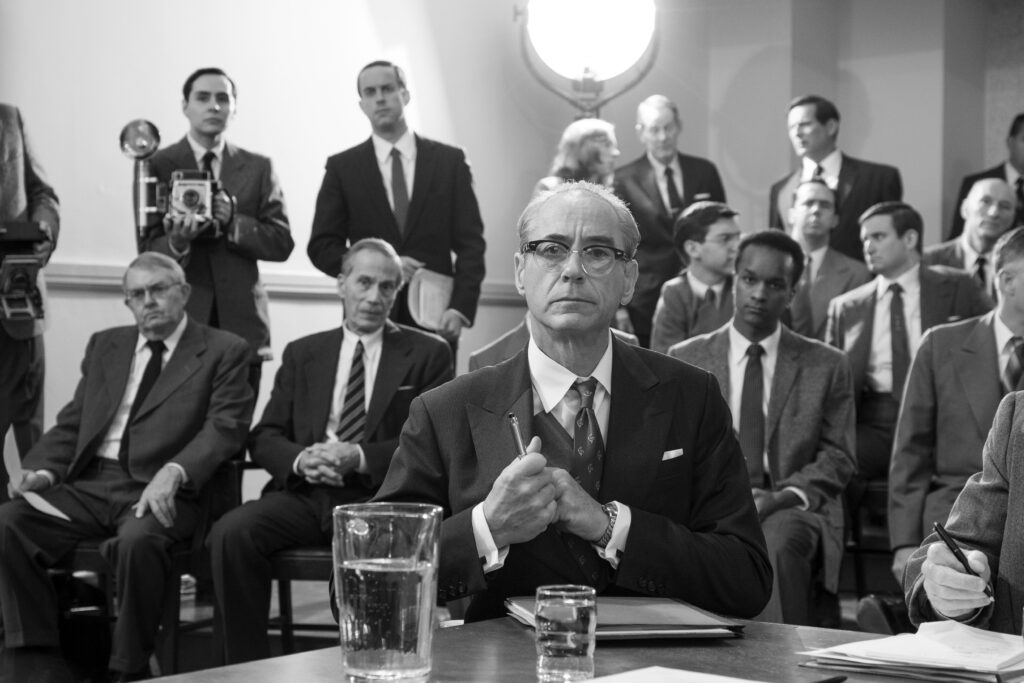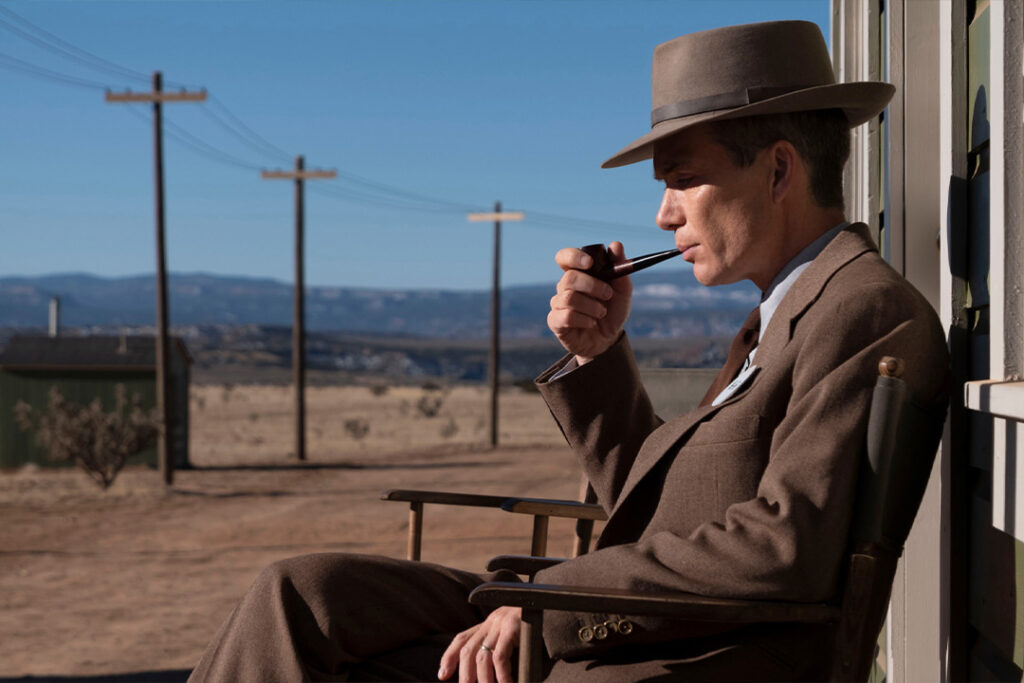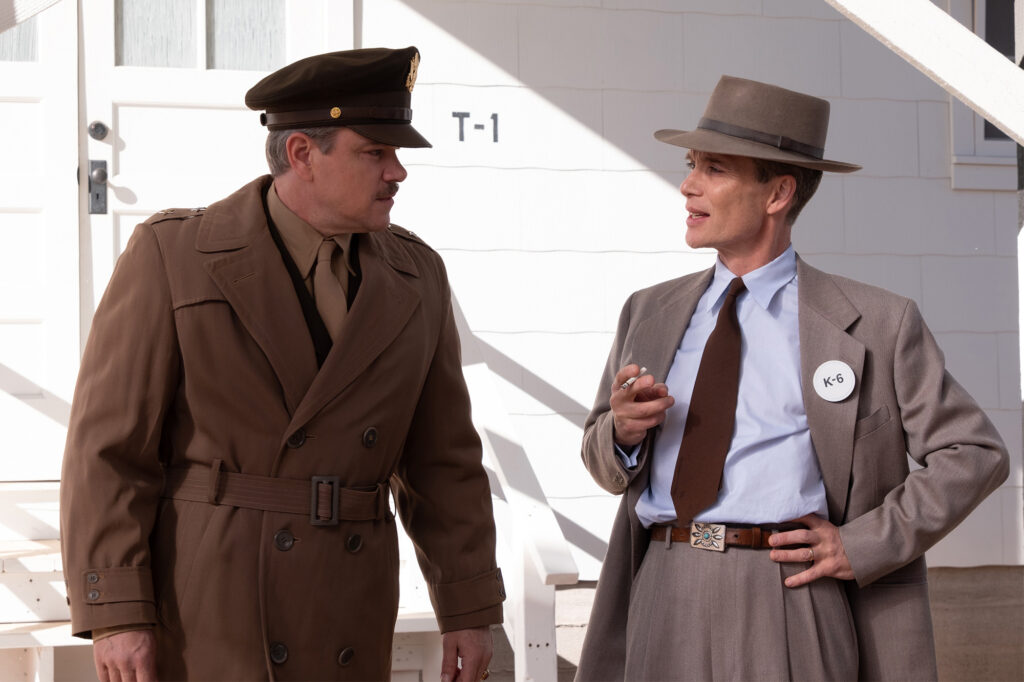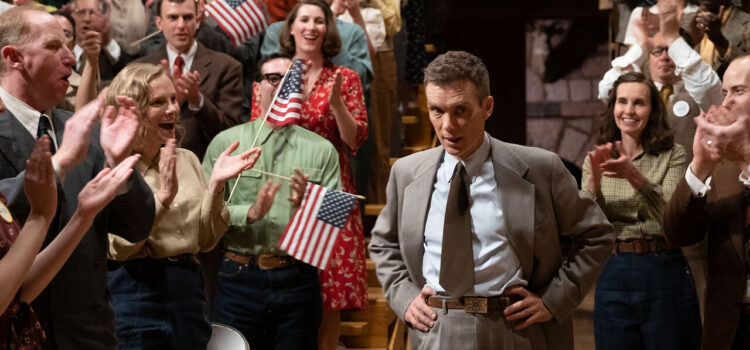By Lynn Venhaus
One of the best films of the year, “Oppenheimer” is a stunning achievement in sight, sound, story, and scope.
Brilliantly directed and written by Christopher Nolan, his first biopic about the “Father of the Atomic Bomb” is his magnum opus. He not only delivers a fascinating historical drama on the genius theoretical physicist J. Robert Oppenheimer’s research and development, but he has crafted it like a big-stakes psychological thriller with many pieces of a puzzle becoming clear over its three-hour runtime.
It was exhilarating to see something this intelligent, lucid, and well-constructed.
Based on the 2005 Pulitzer Prize-winning book, “American Prometheus: The Triumph and Tragedy of J. Robert Oppenheimer” by Kai Bird and the late Martin J. Sherwin, Nolan’s adaptation focuses primarily on the scientist’s rise in the hallowed halls of revered institutions, the U.S. government’s interest in his quantum mechanics work, directing the Los Alamos Laboratory during World War II, his role in organizing the Manhattan Project, and the aftermath of building a nuclear weapon.
This erudite character study explains much in its sharp dialogue that didn’t feel heavy or highbrow, and thanks to the actors’ snappy delivery, naturalistic. Nolan’s verbal dexterity is crucial to this becoming edge-of-your-seat good instead of an academic exercise, and through meticulous detail, infuses a compelling biography with big-picture questions.
Nolan has created some of the best films of the 21st century since “Memento” in 2000, and is known for his cerebral storytelling, nonlinear style, and visual mastery.
Oscar-nominated five times for picture and director for “Dunkirk,” picture and screenplay for “Inception” and screenplay for “Memento,” his films have won mostly technical awards. He has thrilled with his Batman trilogy, impressed with “The Prestige,” and confounded with “Tenet” and “Interstellar,” gaining a fervent fan base.
Even those not as enamored will begrudgingly admit to admiring his commitment to big, bold cinematic grandeur, rarely relying on digital effects. (For instance, no computer-generated graphics in “The Dark Knight.”)

While weaving a grand-scale intricate narrative that flashes back and forward across decades, Nolan creates tension that leads to the “Trinity” code-name bomb-testing that’s one of the most astonishing sequences ever captured on film as he manipulates sight and sound for the Big Bang.
After the bomb is used and the government takes it over from there, the film raises issues about actions causing reactions, scientific advancement, and government responsibility as Oppenheimer is swept into the maelstrom of moral, ethical, and political debates unleashed after the bomb’s use to end World War II.
The story is framed with an unsettling hearing in 1954, the U.S. Atomic Energy Commission, which stripped Oppenheimer of his security clearance, a kangaroo court depicting the post-war Red Scare paranoia. With his leftist leanings, connections to people that were avowed (past) Communists, and fretting over nuclear proliferation, he was accused of being a Soviet spy and became an unfortunate scapegoat.
Nolan uses this backroom thrashing as a look back, intertwining science with politics by effectively alternating color and black-and-white film. It’s a master storyteller at the peak of his craft.
A key element is a mega-cast that features everyone giving their all, creating authentic portraits of people that played a part in history, from Alden Ehrenreich depicting a Senate aide to British actor Tom Conti unrecognizable as Albert Einstein and Gary Oldman’s sly work as President Harry S Truman in one scene.
A longtime fan of Cillian Murphy, I’m happy to see the Irish actor finally taking center stage in a part that seems tailor-made for him, and he’s on screen nearly the entire time. It’s such a virtuoso lived-in portrait, his career best, and he superbly unfolds multiple layers – showing many facets of Oppenheimer’s personality.

Murphy’s most well-known work is as crime boss Tommy Shelby in the Netflix series “Peaky Blinders” (2013-2022), which is about a gangster family in 1900s England. In 2002, he broke through in the Danny Boyle sci-fi masterpiece “28 Days Later,” and has been featured in six Nolan films, starting with “Batman Begins” in 2005 as DC Comics’ villain Dr. Jonathan Crane/Scarecrow.
As the two complicated women in his life, Emily Blunt is bulldog-like in her support, portraying his alcoholic biologist wife Kitty, unapologetic as a stressed-out mom, and Florence Pugh is troubled longtime girlfriend, psychiatrist Jean Tatlock.
Robert Downey Jr. stands out in a shrewd performance as Lewis Strauss, a founding commissioner of the U.S. Atomic Energy Commission and ambitious political climber, and Matt Damon is strong as General Leslie Groves Jr., director of the Manhattan Project.
Josh Hartnett, who fell off mainstream movie radar, roars back as pioneering American nuclear scientist Ernest Lawrence, who worked with Oppenheimer at University of California-Berkeley, and Benny Safdie is once again surprising as theoretical physicist Edward Teller, who disagreed with Oppie on the hydrogen bomb.
A litany of recognizable actors portraying either scientists, military brass or support staff includes Casey Affleck, Kenneth Branagh, Jason Clarke, Dane DeHaan, Tony Goldwyn, David Krumholtz, Rami Malek, Matthew Modine, and Alex Wolff.
You might also be familiar with Dylan Arnold, who plays Robert’s brother Frank Oppenheimer, Michael Angarano as good friend-physicist Robert Serber, David Dastmalchian as William Borden, who filed a complaint with the FBI, Gregory Jbara as Senate Chairman Magnuson, and Macon Blair as Oppenheimer’s defense attorney Lloyd Garrison.
This film leaps to being either a frontrunner or contender in many awards categories, figuring into the year-end conversations. It will be in mine – considerations for film, director, adapted screenplay, lead actor, supporting actor (Downey), supporting actress (Blunt), cinematography, editing, music score, visual effects, production design, costumes, hair and makeup, and sound nominations.
Nolan’s go-to cinematographer Hoyte Van Hoytema, Oscar nominee for “Dunkirk” and showing his keen eye in “Nope,” reaches new heights here, groundbreaking actually. He shot the film partially in black-and-white, and in doing so, made history. In a combination of IMAX 65 mm and 65 mm large-format film photography it includes, for the first time ever, sections in IMAX black and white analogue photography.

So that the sections of the movie could be shot in the same quality as the rest of the film, Kodak developed the first ever black and white film stock for IMAX.
Composer Ludwig Goransson, who won an Oscar for his “Black Panther” score, distinctively guides the tone and the tempo with savvy music choices.
The artisan work is exceptional – especially Jennifer Lame’s decisive editing, and the sound editing and mixing technicians’ advanced capabilities (Richard King, Michael W. Mitchell, Kevin O’Connell, Gary A. Rizzo leading the way.)
Luisa Abel’s expert makeup and prosthetic department’s aging visages appear realistic, and costume designer Ellen Mirojnick’s looks for tweedy academia, active soldiers, swanky party guests and ‘40s housewives are spot-on, factoring in desert, Northern California, and New England climates.
Ruth De Jong’s production design spans decades and locations with accurate retro recreations, as Nolan moves from ‘20s grad school in Germany to ‘30s UC-Berkeley classrooms, to ‘40s Princeton, deserts and mountains, wartime New Mexico and McCarthy-era Washington D.C.
“Oppenheimer” harkens back to those mammoth blockbusters of old, those sweeping epics filmed by David Lean that captured our fancy. It is rare to see a movie of this magnitude be this satisfying, but it is nuanced filmmaking at its finest. Go see this big-brained movie on the biggest screen possible.

“Oppenheimer” is a 2023 drama-thriller-biography written and directed by Christopher Nolan and starring Cillian Murphy, Emily Blunt, Matt Damon, Robert Downey Jr., and Florence Pugh. It is Rated R for some nudity, sexuality and language and runs 3 hours. It opens in theaters on July 21. Lynn’s Grade: A.
Note: this review was written during the 2023 WGA and SAG-AFTRA strikes. Without the labor of the writers and actors currently on strike, the movie being covered here wouldn’t exist.

Lynn (Zipfel) Venhaus has had a continuous byline in St. Louis metro region publications since 1978. She writes features and news for Belleville News-Democrat and contributes to St. Louis magazine and other publications.
She is a Rotten Tomatoes-approved film critic, currently reviews films for Webster-Kirkwood Times and KTRS Radio, covers entertainment for PopLifeSTL.com and co-hosts podcast PopLifeSTL.com…Presents.
She is a member of Critics Choice Association, where she serves on the women’s and marketing committees; Alliance of Women Film Journalists; and on the board of the St. Louis Film Critics Association. She is a founding and board member of the St. Louis Theater Circle.
She is retired from teaching journalism/media as an adjunct college instructor.

